The “User generated content Olympics” - 2008 style
People have been calling it the “social media Olympics” and the “mobile Olympics”, but one of the phrases that seems to have dropped out of favour in the last couple of years is calling stuff “UGC”. But I’ve seen a couple of great examples of the “User generated content Olympics”.
And no, I’m not talking about athletes going on Reddit to discuss their privates.
Adrian McShane has had Olympics Aliviator “Sport Event Thing!” running. It pulls in Olympic related material posted to social networks, and presents them in a unified interface, which you can filter down to social media generated by individual events in the Games.
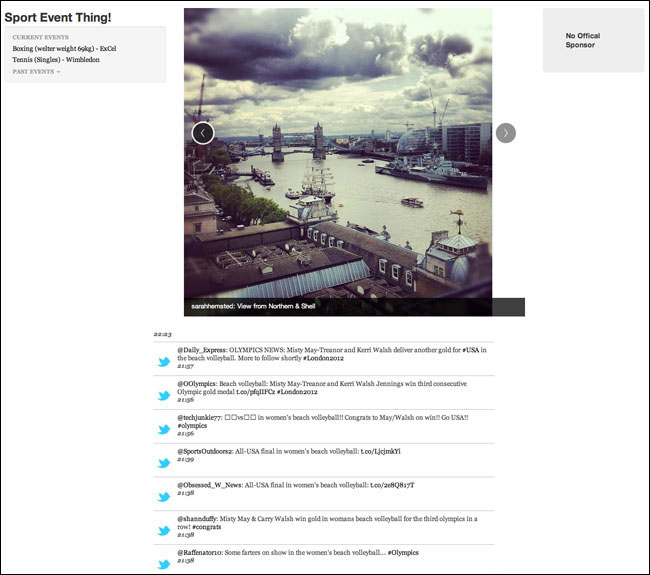
Adrian McShane’s “Sport Event Thing!”
There is also “This is London now”, which describes itself as “a highly addictive real-time visualization tool displaying all the photos as they happen within London on Instagram.”
Whilst this isn’t specifically for the Olympics, watching it tick over in the early evening you can’t help but notice that something is going on in the city - with many of the photos featuring the much-maligned but very distinctive London Olympic branding.
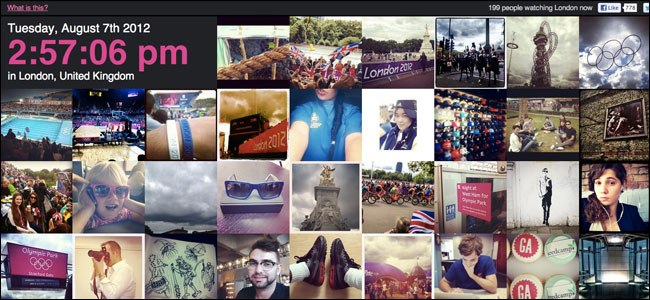
A screenshot of “This is London now” featuring plenty of Olympics material.
Which all makes me think back to Beijing in 2008 - when I ran a site for aggregating what was then called UGC around the Olympics. Fansivu - a dreadful pun on fans-eye-view - pulled in images and tweets that I could associate with the Olympic Games.
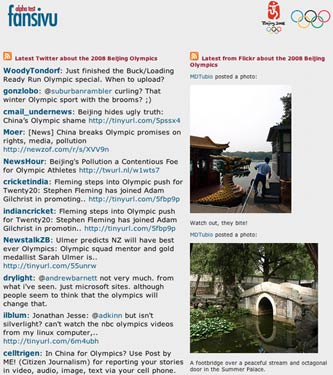
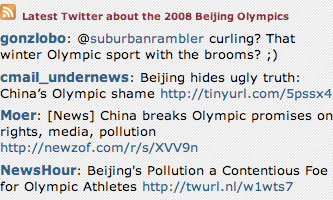
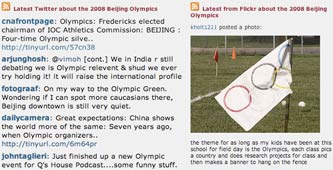
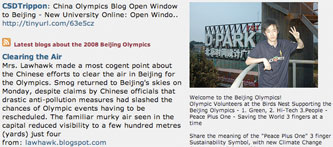
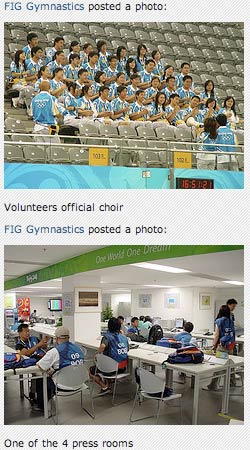
Screenshots of Fansivu, which I built in 2008.
Here are four quick things I’ve noticed that are different about aggregating UGC in 2012 rather than 2008...
The volume is turned up to eleven
The volume of social media is so much higher, and the sources much wider. And I could be wrong, but I don’t recall any news stories from 2008 generated by the Olympic athletes themselves tweeting.
APIs are much better
In 2008 I was mostly grappling with taking some RSS feeds and mangling them around a bit. The 2012 versions have been built from much more structured and open APIs than I had to work with four years ago.
Geo-tags FTW!
The penetration of smartphones with GPS capabilities automatically geo-tagging pictures makes it much easier to sort the wheat of “Here I am in an Olympic venue” from the chaff of “Here I am anywhere in the world but I’ve mentioned the Olympics”
Work that social media
When I launched Fansivu in 2008 I had one advantage over new sites today - I don’t recall there being an automatic sandbox penalty for a new domain in Google. And I’d done a Euro2008 test run of the site anyway to warm the domain name up. But once I published the site and did a blog post, there wasn’t a great deal else I could do with social media to promote it. By contrast, in 2012 I’ve noticed Olympics Aliviator and “This is London now” mentioned over and over again in my feeds. Social media gives you a much greater opportunity of promoting a new service or experiment.
“Keeping the Torch Burning: Terror, Protest and the Games” is an alternative history of the Olympic Games, one that focuses on the social and political events that have defined each competition. Nationalism, separatism, feminism, racial equality and human rights ring loud in this Guardian Short, written by Martin Belam and uniquely told through first-hand reporting from the Guardian and Observer.
“Keeping the Torch Burning: Terror, Protest and the Games” - £2.99 on Kindle
